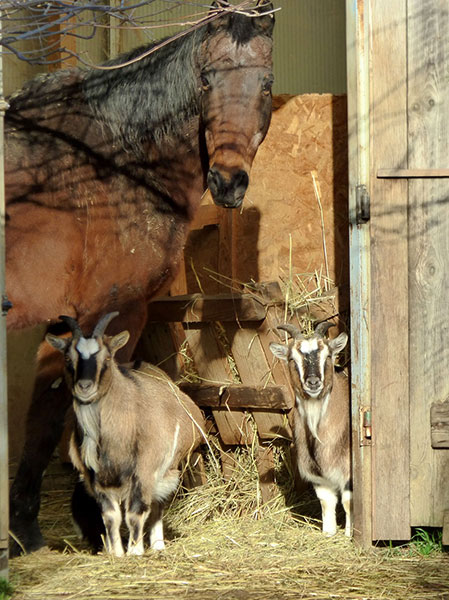
Goats are used as companions for horses primarily because of their calming presence, herd instincts, and cost-effectiveness compared to other horses. This practice is common in racehorse stables, where highly-strung and nervous horses can benefit from a goat's soothing company.
In fact, the phase, “Getting someone’s goat” is known to have racehorse roots!
One widely circulated story suggests that trainers would place a goat in the stall of a high-strung racehorse to keep it calm before a big race. Opposing trainers would sometimes steal the goat, hoping to upset the horse and cause it to perform poorly.
"Getting someone's goat," in this sense, meant intentionally causing a person or animal distress.
Calming influence
- Reduces stress: Horses are prey animals and feel safer in a herd. A goat can serve as a non-threatening and predictable "barn buddy" that reduces anxiety in a single or nervous horse. This can help curb nervous behaviors such as pacing, stall-walking, or cribbing (chewing on stall edges).
- Reliable companion: Goats tend to be steady and predictable, which can be comforting to horses, particularly young thoroughbreds in high-pressure training environments. The bond can become so strong that both animals may show signs of stress if they are separated.
Cost and convenience
- Lower cost: Keeping a goat is far less expensive than owning a second horse, which involves significant costs for food, veterinary care, and farrier work.
- Less space: For horse owners who only have enough space for one horse, a goat is a manageable addition that doesn't require a large extra pasture.
Herd animal instincts
- Natural bonding: Both horses and goats are herd animals, and when raised together, they tend to bond easily and quickly. They can become deeply attached and even protective of one another.
- Playful interaction: Goats are naturally sociable and playful creatures, which can provide entertaining and engaging company for a horse.
Pasture maintenance
- Complementary grazing: Goats are browsers, meaning they prefer to eat weeds, shrubs, and brush that horses, as grazers, typically ignore. This can help improve pasture quality by clearing out undesirable plants without competing with the horse for grass.
- Parasite control: Because horses and goats are susceptible to different internal parasites, they can safely graze together without increasing the risk of infection for either species.
Potential challenges
While often successful, using goats as horse companions is not without risks.
- Injury risk: A large horse could accidentally step on or kick a smaller goat, especially if they are not well-socialized or if the horse is territorial.
- Dietary needs: While they can share a pasture, horses and goats have different dietary needs. Goats can be sensitive to the copper content in some horse feeds, so it's important to feed them separately.
- Fencing requirements: Goats are notorious escape artists and require more secure fencing, such as woven-wire or electric fencing, than horses do.
We’ve seen many horses who welcomed a goat in their lives and it’s a way for a lonely or nervous horse to have some calm company!
You can find more informative articles in our section on Recreation & Lifestyle. Take a look at our Curated Amazon Store for our selections in a wide variety of categories!

































